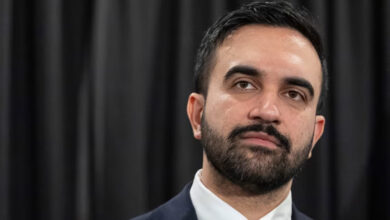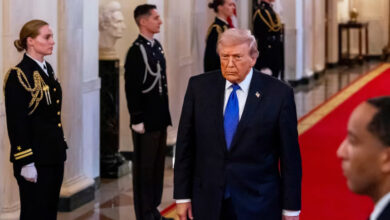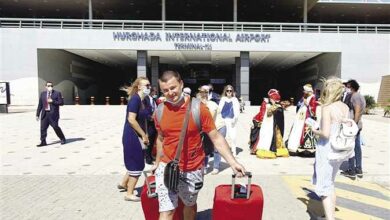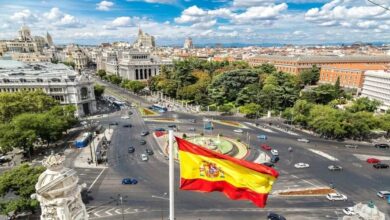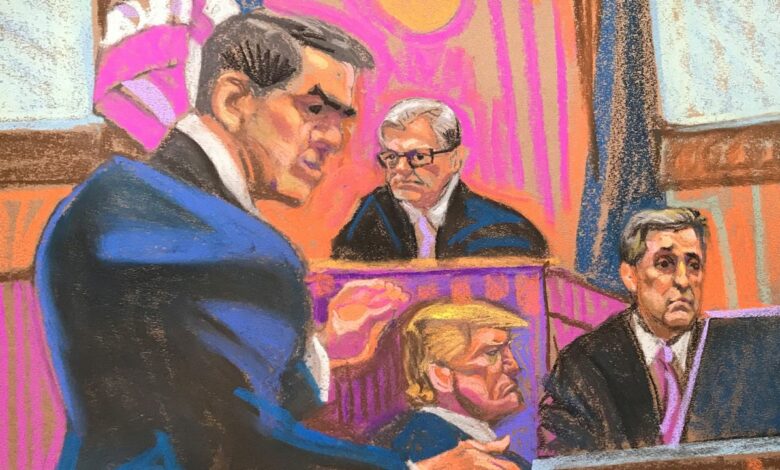
The presumptive GOP presidential nominee is due back in court amid clear signs the hush money trial is drawing toward a close — unless he takes the risky decision to testify in his own defense, a step that would lengthen and complicate the proceedings.
Defense lawyers say they expect to complete their bruising cross-examination of Cohen, Trump’s former lawyer and enforcer, on Monday morning. Prosecutors will then use their second chance to question Cohen to try to patch up any doubts the ex-president’s team may have sown in the minds of jurors about his version of events.
New York state prosecutors allege Trump broke the law by falsifying financial records to cover up a hush money payment to adult film star Stormy Daniels. This, they say, was to deceive voters in 2016 in an early example of election interference. Trump denies having an affair with Daniels and has pleaded not guilty.
In dramatic testimony, Cohen last week directly implicated Trump in the alleged scheme, saying the former president directed him to hand over $130,000 to Daniels and promised him reimbursement. “Just do it,” Cohen said in describing his boss’s alleged order to make the payment — insisting that Trump was worried the story could doom his campaign.
But in a critical moment under cross-examination, Cohen appeared to trip up over an account of a call he’d previously said under oath was to discuss the payment. But the call, at least to begin with, appeared to be about another matter entirely.
Trump attorney Todd Blanche produced a text from before the call that Cohen sent to bodyguard Keith Schiller, who was with Trump at the time, in which Cohen said he wanted help dealing with a 14-year-old who was prank calling him. He didn’t mention Daniels in the text despite later testifying that the purpose of the call was to discuss the situation surrounding her. “That was a lie!” Blanche declared, leading Cohen to insist: “I believe I also spoke to President Trump and told him everything regarding the Stormy Daniels matter was being worked on and it’s going to be resolved.”
The defense is also trying to portray Cohen as being obsessed with bringing Trump down and has brought up a stream of insults he flung the ex-president’s way on social media and television, including when he called Trump a “Cheeto-dusted cartoon villain.”
Cohen has long been seen as a potentially problematic witness, given his record of falsehoods and his own conviction — for events related to the hush money payment and for other offenses including lying to Congress. The prosecution, therefore, built a structure of testimony before he took the stand, including from former associates of the ex-president, to try to corroborate what he would say. But they apparently did not foresee everything, including the text exchange with Schiller.
In their redirect examination, therefore, prosecutors are likely to try to mitigate Cohen’s testimony about the call. But if jurors think Cohen lied about the content of the call with Schiller and about whether he spoke to Trump, they could begin to doubt other aspects of his testimony. “That is exactly what the judge will instruct the jury: ‘If you find anything that a witness said to be untrue, to be incredible, to be a lie, feel free to disregard the entirety of that witness’s testimony,’” Randy Zelin, a trial attorney and adjunct professor at Cornell Law School, said on “CNN News Central” on Friday.
Trump’s lawyers need to create reasonable doubt in the minds of just one juror to open the possibility of a hung jury or an acquittal.
Questions mount over scope of defense case
Scrutiny of Cohen’s testimony was the latest twist in the presumptive Republican nominee’s multifront legal saga, which includes three other criminal indictments and has meant the path to the 2024 election has run more through the courts than the campaign trail. Trump has pleaded not guilty to all charges against him — in two cases related to his attempt to overturn the 2020 election and one over his hoarding of classified documents at his Mar-a-Lago resort. And he’s rooted his bid to reclaim the White House in claims of political persecution.
There is no evidence that Trump is the victim of a coordinated attempt by President Joe Biden to weaponize the justice system against his rival, despite such claims by a parade of Republican lawmakers flocking to the Manhattan court in recent days. The most prominent visitor was House Speaker Mike Johnson, who brought the symbolism of his office to bear in an extraordinary attack on the judge and the case. The Louisiana Republican also attempted to discredit Cohen, joining fellow Republicans in bolstering Trump’s own attacks after the judge threatened the ex-president with jail if he continued to infringe on a limited gag order.
With the end of Cohen’s testimony looming, there is uncertainty over the extent of Trump’s defense case. His attorneys have said they may call at least one witness — Bradley Smith, a former commissioner of the Federal Election Commission. Judge Juan Merchan indicated Thursday that he was reluctant to change limits he has already placed on the scope of any such testimony. Merchan has ruled Smith could discuss the role and function of the FEC and define certain terms related to campaign finance but cannot say whether the law was violated in this case.
The greatest unknown — apart from the verdict — is whether Trump will take the stand
There are many reasons why testimony from the accused is often viewed as risky for the defense in any case. But when the defendant is as difficult to control and prone to assaulting the truth as the former president, the stakes are even higher. Trump initially said he would testify — as he often threatens to do in his legal dramas — but then appeared to backtrack by falsely claiming a gag order in the case designed to protect witnesses and court staff meant he could not.
Blanche referred to the possibility of Trump’s testimony on Thursday, the last day the court was in session. “That’s another decision that we need to think through,” Blanche said. After days on the defensive, Trump’s attorneys may have finally succeeded in making the credibility of Cohen an important factor in the trial last week. But an appearance by Trump could be a massive distraction from Cohen’s problems. It could also open up the former president to being probed on inconsistencies in his own story. And Trump may be asked about details of the alleged liaison with Daniels in Lake Tahoe in 2006 that he denies took place.
Trump has often left no doubt that he considers himself his own best advocate. Throughout his business career and political life, he has been notoriously impossible for subordinates to control. During this trial, he has used breaks in courtroom action to address reporters to shape public perceptions of the case because there are no television cameras in court. The temptation to take the most critical turn in his own trial — and to try to create even more of a political circus than he has already — may be irresistible.
Trump did take the stand in a civil fraud case against him, his adult sons, and his business organization in November. The judge in that trial, Arthur Engoron, tried initially to keep Trump under control, but the testimony soon turned into a replica of the ex-president’s unchained campaign trial rhetoric, much to the judge’s frustration. And Trump’s histrionics appear to have harmed him as Engoron wrote in a civil judgment against Trump worth nearly half a billion dollars that the ex-president and his sons showed a complete lack of contrition and remorse for massive frauds that bordered on the “pathological.” The critical difference in the hush money criminal case is that it will be adjudicated by a jury and not a judge.
After the defense case wraps up, the prosecution has a chance to put on its own rebuttal. Next come the summations of the case from prosecutors and the defense — a process Merchan said he hopes to begin as early as Tuesday.
Then, the lawyers leave the stage, and the judge instructs members of the jury on the law they must apply in their deliberations. It is at that point, when the jurors retire to consider their verdict, that the country will be in suspense, waiting for the unprecedented moment when it will learn whether, for the first time, a former president will be convicted of a crime.

